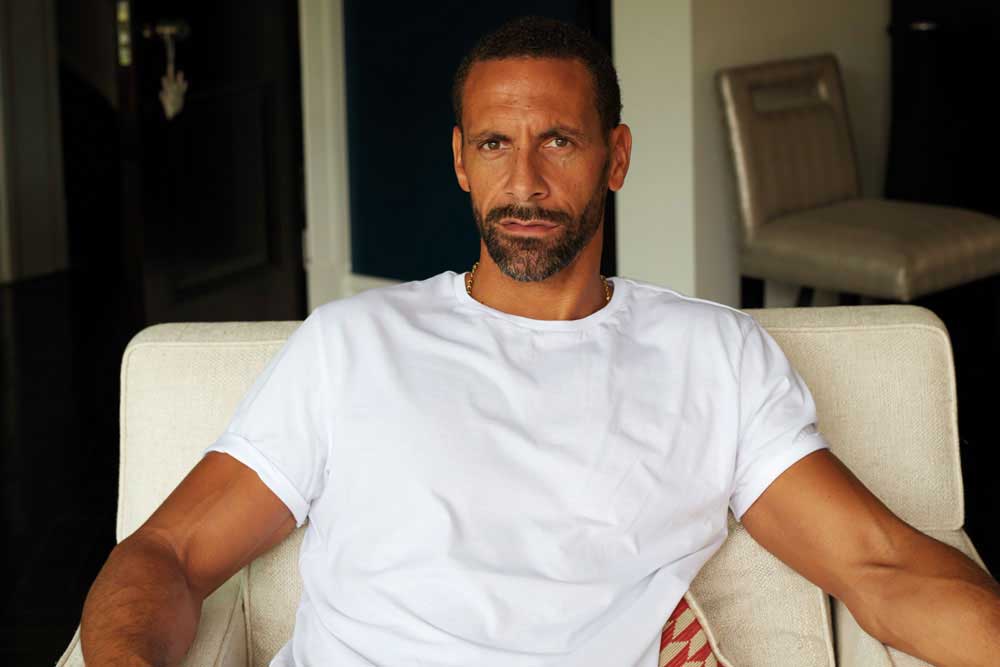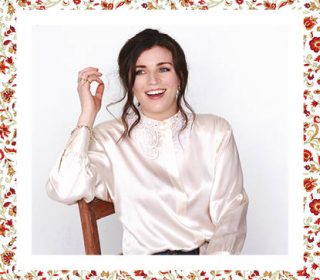#TalkingOutLoud: Rio on love, grief and parenthood

Until two years ago Rio Ferdinand epitomised the professional sportsman.
A footballer at the top of his game, his primary focus was how to be the best. His wife and children could only watch from the wings as he proclaimed that ‘no relationship matters more than winning’ and at the time he meant it. Today, Rio is a very different man.
He’s come straight from the gym and his physical fitness is still at its peak. But we’re not here to talk about his body; we’re here to talk about his mind and the transition it’s gone through since he lost his wife, Rebecca, to cancer in 2015. She was 34.
‘Looking back, I can’t believe I even said that,’ he says of his own quote. ‘But it was how I felt at the time.
‘I was on a weird merry-go-round, though, because winning bought me no joy, all it delivered was relief. I’d get to the top of the mountain, but immediately want to go straight back down and start again. You don’t stop to enjoy it. It’s a craziness that goes on in your head.’
Children came first
Rio admits that if Rebecca hadn’t died, he’d probably be the same now. But being left with the responsibility of bringing up their three young children alone hit him hard.
‘The immediate days after losing Rebecca were very dark,’ he says. ‘I just felt so totally lost and alone. There were people around me all the time, but I was unreachable. I kept looking at the children and wondering what the hell I was going to do.’
Ironically, this was also what got him out of bed each morning. ‘I had to do it for the children,’ he says.
‘Rebecca was all about routine, so I caught on quickly that they had to have structure to their days. I had to keep some form of normality going for them.’
There were many days when Rio just didn’t feel that he was good enough. Even now, he questions his ability.
‘It’s been difficult for me because I come from a background where my own mum and dad never showed me any touchy-feely love – they didn’t even sit on the same sofa. That, coupled with being trained as a footballer, meant I’ve never found it easy to show my emotions, how to show love on a one-to-one basis.’
Rio’s mum, Janice, was the family’s rock when Rebecca died, lending practical and emotional support. In a devastating twist of fate, Janice lost her own battle with cancer last July and the hole the two women have left is almost palpable.
‘This sort of thing happens to other people,’ says Rio. ‘Not me. I’ve always been able to control most outcomes in my life. On the footie pitch I’ve got control. On the training ground I’ve got control.
‘But there’s no controlling cancer – it just comes and takes your whole life by the scruff of the neck and drags you wherever it wants to drag you.’
In his journey to find himself, Rio began to talk to counsellors and other widowers of a similar age. ‘I was sceptical at first,’ he admits. ‘I didn’t believe talking could help. But bit by bit, I began to see the benefits.’
Pulling no punches
‘I realised after just 15 minutes of meeting other widowers that I needed more help than I was admitting. Then I met Emily from Bereavement UK, who suggested we create a memory jar for Rebecca, so whenever we remember something, no matter how trivial, we write it down and put it in the jar.’
For Rio it was a huge breakthrough; it allowed him to see the thought process and emotion the children felt about their mum.
‘They’ve opened up even more since,’ he says. ‘It’s been very hard for them as they’ve lost two huge people in their lives, but we have to move forward as much as we can.’
For Rio, part of that process is to put himself back into the sporting arena. Having retired from football shortly after Rebecca’s death, he misses the competition and has set his mind on becoming a professional boxer.
Until then, Rio is also focusing on his personal life and trying to live it without guilt. ‘Darren Clarke, the golfer, who lost his first wife to cancer, said to me, “You will be happy again and only you will know when the time is right.”
‘I’ve still got a long way to go, but I’m making strides forward. I now know how to show my love, so nobody in my life will ever be in doubt about how I feel again.’
Rio Ferdinand’s book Thinking Out Loud: Love, Grief and Being Mum and Dad (£20, Hodder & Stoughton) is out now.
WHAT HAS RIO LEARNED?
Guilt is normal and natural, but not your friend. Grief is the main emotion, but most will feel guilt as well. One trick I’ve found helpful is when you talk to yourself, pretend you’re talking to a friend you care about. Stop listening to that guilty voice in your head. Ignore it.’
‘Rather than say you “always” feel miserable, try saying “sometimes”. If you find yourself thinking I can never be happy, write it down. Then think of any tiny moments of happiness and write those down. Now – you can “never” be happy? Ask yourself if it’s really true.’
‘Let a loved one talk about dying if they want to. If someone you love is dying and wants to talk about it, don’t stop them. How they use the time they have left is not up to you. It’s not cruel to let them talk that way, it’s the most loving thing you can do.’








